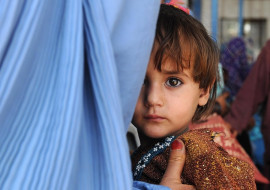
The official withdrawal of American-led troops from Afghanistan late last year and the resurgence of Taliban attacks despite continuing Nato presence in the country has jeopardised the freedoms earned by women over the last decade. “As soon as [the] Americans leave, [the] Taliban will most likely take over again,” says Parkha, a housewife residing in Khoygani, a village just outside of Jalalabad, Afghanistan. “Some people say [the] Taliban are gone, but they are here and waiting for the Americans to leave so they can start killing again.”
Improving the quality of life for Afghan women was a priority during the United States’ war in Afghanistan — the longest US war to date — but the outcome of such ambitions, has been tenuous. In 2005, the then-US secretary of state Condoleezza Rice declared that women’s equality must be included in the Afghan Constitution in order to improve their quality of life. Women’s right to education was among one of the major government reformations when the Taliban were ousted in 2001.

Supporters of Afghan presidential candidate Zalmai Rassoul prepare to leave after an election rally in Mazari Sharif in northern Afghanistan. PHOTO COURTESY: REUTERS
Undoubtedly, some women have gained footing in the public sphere over the last 14 years of American occupation, but the majority of women remain sequestered to their homes, according to a Diplomatic News Agency report on the status of Afghan women. Notably, the increase in Taliban attacks since 2011, especially in the south, have deterred women from social mobilisation despite the struggle of women’s equality in the region by international aid workers and educated Afghans.
Last year, for example, the Taliban were suspected of gas-poisoning 74 girls at a school in the northern province of Takhar. Amidst deadly attacks on educational institutions, especially against girls, former president Hamid Karzai closed 550 schools across the country due to Taliban threats. This political move put 300,000 students out of school. “Women’s future depends so much on security. As security deteriorates, women’s situation deteriorates [with it],” says Masuda Jalal, the former acting minister of women’s affairs in Afghanistan. “At the first sign of insecurity, the head of the family protects his women and children, and the first measure they take is to keep them inside the house,” she adds. The deadly December attack on the Army Public School in Peshawar by the Taliban has only enhanced the security threat to schools and remains a problem on both sides of the Af-Pak border.

Afghan critics claim that the elected government of president Karzai had done relatively little for women’s rights besides removing Taliban restrictions such as the requirement for women to cover their faces in public.
Feminist lawyers trained in Sharia law argue that the tradition of male authority in Afghanistan is cultural, not Islamic. “In Islamic history, men have been the boss. They want to be the boss forever,” says Rahala Salim, a former judge. “That’s why they never want women to appear in public, but that is not Islam; that is cultural tradition.” Accordingly, it is common practice in many uneducated households to keep women at home to avoid possible confrontation or militant threats.
Today, whilst Afghanistan has women working in the army and police forces, it remains uncommon for women to come forward to report domestic violence. One policewoman who was interviewed in the report, a mother of six children and a former Taliban prisoner, explained that the majority of abused women are so afraid for their lives that they do not feel comfortable stepping outside their homes to make a formal complaint against their abusers. She further described how female victims of domestic violence fear their husbands will kill them if they complain to the police.

Educated Afghan women are attempting to improve the overall situation of women in the country through Islamic education. Last summer, Jalal organised a meeting of 100 mullahs in Kabul to review women’s rights in the Holy Quran in hopes that the pro-equality outcomes will trickle into government ordinances. She plans to continue these meetings in hopes of improving women’s rights in the country through Islam. “I would like education to flourish in our village, especially for women so that they can take up different professions in the city,” says Parkha. For the time, however, the state of women’s rights in Afghanistan remains as volatile as the political future of the country.
Carol Khan is a subeditor on The Express Tribune Peshawar desk. She tweets @carolkhan_
Published in The Express Tribune, Sunday Magazine, February 8th, 2015.



































































COMMENTS (3)
Comments are moderated and generally will be posted if they are on-topic and not abusive.
For more information, please see our Comments FAQ